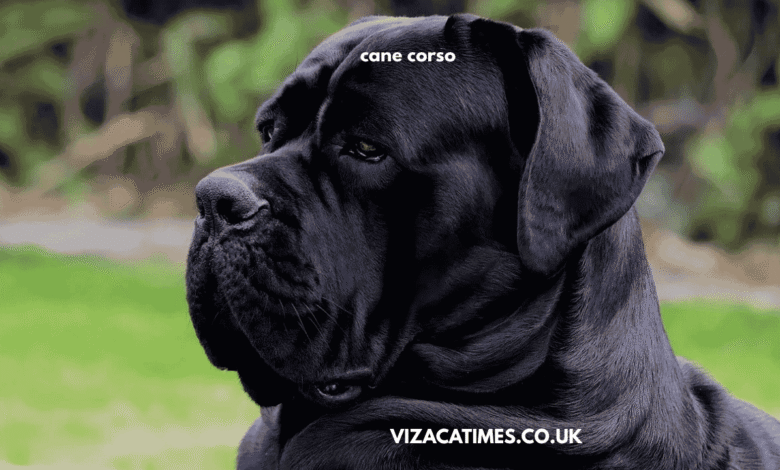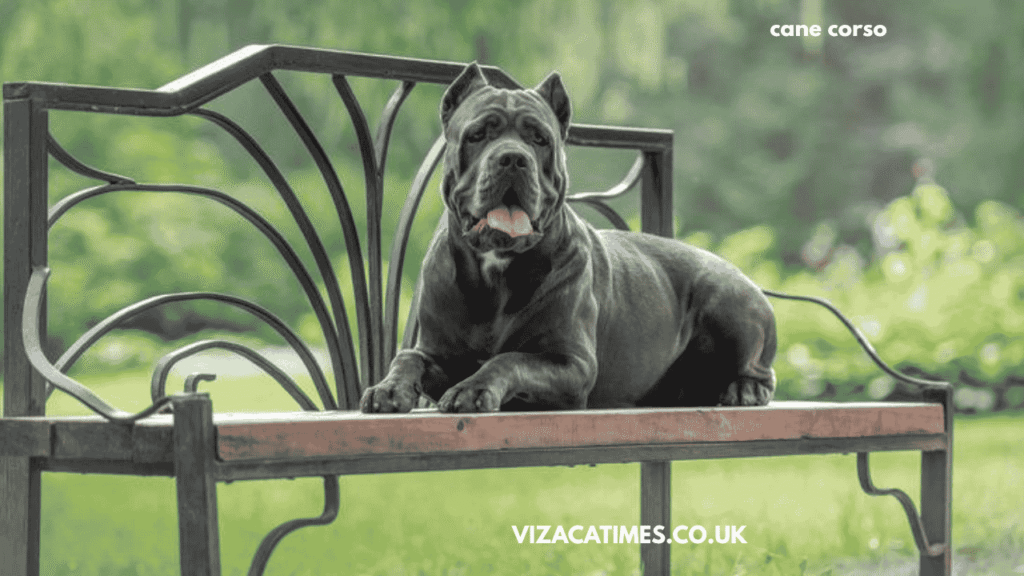Cane Corso, ?? — Exploring the Legacy, Traits, and Care of This Majestic Guardian

The Cane Corso, ??, is a breed that exudes power, intelligence, and unwavering loyalty. Often described as a formidable yet affectionate guardian, this Italian mastiff has captivated the hearts of dog lovers across the world. With its ancient roots, striking appearance, and distinct personality traits, the Cane Corso has much more to offer than its muscular physique might initially suggest. In this comprehensive guide, we delve into every vital aspect of the Cane Corso, ??, exploring its history, temperament, training needs, health considerations, and more.
The Origins of the Cane Corso, ??

The Cane Corso (pronounced KAH-neh KOR-so) is a direct descendant of Roman war dogs, particularly the Canis Pugnax. Bred in Italy, it was historically used as a hunter of large game, a protector of livestock, and a formidable guard dog. Its name is derived from the Latin word “cohors,” meaning “protector” or “guardian of the courtyard.”
Over centuries, the Cane Corso adapted to different roles—defending farms, herding cattle, and even aiding in hunting boar. The breed nearly went extinct after World War II due to industrialization and changing agricultural practices. However, through careful restoration efforts by breed enthusiasts in the 1970s, the Cane Corso made a strong comeback and gained international recognition.
Distinctive Physical Features of the Cane Corso, ??

The Cane Corso has a commanding physical presence. Males typically weigh between 100 to 120 pounds and stand 25 to 27.5 inches tall at the shoulder, while females are slightly smaller but equally imposing. Its short, dense coat comes in a variety of colors including black, gray, fawn, and brindle.
Other striking features include:
- A broad, expressive head with a strong jawline.
- Almond-shaped eyes that convey alertness and depth.
- A muscular, athletic build suited for agility and endurance.
- A naturally docked tail (in some countries) and cropped ears, although natural looks are gaining popularity.
Despite its large size, the Cane Corso is remarkably agile and moves with a confident, purposeful gait.
The Temperament of the Cane Corso, ??

Intelligent, assertive, and deeply loyal, the Cane Corso is not just a guard dog—it’s a companion that bonds intensely with its family. However, this loyalty also translates into a high level of territorial instinct. The breed can be wary of strangers and protective when it senses a threat, making early socialization a crucial part of upbringing.
Key temperament traits include:
- Protectiveness: Cane Corsos are natural guardians and will do anything to protect their home and loved ones.
- Intelligence: Their sharp minds need constant stimulation and challenges.
- Affectionate Nature: Despite their imposing demeanor, they are known to be loving, especially with children and close family members.
- Confidence: A properly trained Cane Corso is calm and confident, not fearful or overly aggressive.
However, novice dog owners should approach this breed with caution. It requires a handler who is consistent, assertive, and experienced in managing dominant dogs.
Training and Socialization for the Cane Corso, ??
Proper training is essential to unlock the full potential of the Cane Corso, ??. Due to their high intelligence and dominant tendencies, they thrive under structured routines and consistent guidance.
Training tips include:
- Early Socialization: Introduce the Cane Corso to a wide variety of people, environments, and other animals from a young age.
- Positive Reinforcement: Use reward-based methods rather than harsh discipline to encourage good behavior.
- Leadership: Establish yourself as the calm and confident leader. A Cane Corso will not respect inconsistent or passive handlers.
- Ongoing Education: Obedience training should not stop at puppyhood. Adult Cane Corsos need continued engagement through commands, agility work, or protection training.
Without proper training and socialization, the Cane Corso may become overly dominant or reactive, which could lead to behavioral issues.
Living Conditions and Exercise Needs of the Cane Corso, ??
The Cane Corso thrives in environments where it has space to move and a job to do. Apartment living is not ideal unless the owner is extremely dedicated to providing daily physical and mental exercise.
Key considerations include:
- Exercise Requirements: This is an active breed that needs at least 60–90 minutes of vigorous activity daily. Walks, play sessions, and structured tasks are all essential.
- Mental Stimulation: Cane Corsos are thinkers. Puzzle toys, training drills, and interactive games will keep their minds sharp.
- Secure Environment: Due to their guarding instincts, they need a securely fenced yard and should not be allowed to roam freely.
Failure to meet the Cane Corso’s physical and mental needs can lead to boredom, anxiety, and destructive behaviors.
Health Considerations for the Cane Corso, ??
The Cane Corso, ?? is a robust breed, but it is not without health risks. Understanding common medical issues can help owners ensure a long, healthy life for their companion.
Some of the more frequent concerns include:
- Hip and Elbow Dysplasia: Common in large breeds, this condition affects mobility and quality of life.
- Bloat (Gastric Dilatation-Volvulus): A life-threatening emergency where the stomach twists and traps gas.
- Eye Problems: Conditions such as entropion and cherry eye can develop.
- Heart Issues: Dilated cardiomyopathy has been noted in the breed.
- Skin Sensitivities: Regular grooming and skin care can help prevent infections.
Regular vet checkups, a high-quality diet, and adequate exercise are key to managing these risks. The average lifespan of a healthy Cane Corso is between 9 and 12 years.
Grooming and Diet Essentials for the Cane Corso, ??
While the Cane Corso has a short coat that’s easy to maintain, regular grooming helps to keep them looking and feeling their best.
Grooming needs include:
- Weekly brushing to remove loose hair and minimize shedding.
- Bathing only as needed to maintain skin health.
- Regular cleaning of ears, eyes, and teeth.
- Nail trimming every few weeks.
As for diet, Cane Corsos require high-quality, protein-rich food suited for large and active breeds. Avoid overfeeding as the breed is prone to joint problems if it gains excess weight.
Is the Cane Corso the Right Dog for You?
Choosing a Cane Corso is not a decision to take lightly. Their beauty, strength, and loyalty come with serious responsibilities. They require:
- Time and energy for daily training and exercise.
- A structured home environment.
- An experienced, confident owner.
- Financial investment in food, medical care, and training.
For the right person, however, the Cane Corso is not just a dog—it’s a protector, a friend, and a lifelong partner.
Conclusion: Embracing the Cane Corso, ??
The Cane Corso, ??, is a majestic, deeply devoted breed that brings a powerful presence and unwavering loyalty to any home. Its origins as a Roman war dog echo through its confident stance and intelligent gaze. But beyond the brawn lies a heart that bonds fiercely with its family and thrives on purpose and connection.
Whether you’re drawn to their guarding instincts, their aesthetic appeal, or their capacity for deep companionship, owning a Cane Corso means embarking on a journey of mutual respect, trust, and lifelong learning. For those prepared to meet the breed’s needs and challenges, the Cane Corso offers a uniquely rewarding experience unlike any other.
Also Read : Rock Paper Scissors Yellow Dress Full Video, ?? – The Mystery, Virality, and Everything Behind It



